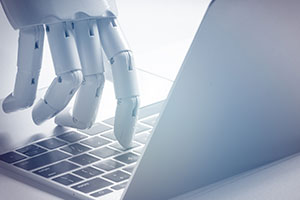
Everyone says artificial intelligence (AI) represents the wave of the future. AI involves the simulation of intelligent human behavior in computers. It uses algorithm-driven programming that allows the computer to explore and adjust to all possible choices and select the ideal outcome. Tech enthusiasts claim computers can approximate or even exceed human action.
Nowhere is the drive to reduce everything to algorithms stronger than at online high-tech firms. Powerful processing of personal preference data is supposed to suggest the most probable purchases. Everyone has experienced the pop-up advertisements that recommend needed goods based on past searches. With every click, AI promises to work with more sophistication. Some services even offer automated decision-making and purchasing without any supervision.
Increasing Complaints From Consumers
However, high-tech firms are receiving increasing complaints from consumers. Predictably, algorithms might select optimum outcomes but not necessarily human ones. The programs cannot navigate the nuances that often influence decisions. They are offending and frustrating consumers.
Companies started to notice that marketing that uses algorithms was getting weighed down by rejected choices. People would swipe through mountains of selections on their devices without finding what they wanted. Worse yet, consumers were frustrated about the wasted time, unwanted items and need to return purchases.
Companies are adjusting to the complaints with solutions that don’t use algorithms but humans.
Human Enhancement
They call it “human enhancement,” although business savvy might be a better term. It entails introducing human judgment at some point in the selection process. The human decisions maker might draw from the same pool of algorithm-generated choices, but the human touch makes all the difference.
Help Remove Jesus Bath Mat on Amazon
Indeed, humans bring experience and judgments that can sometimes result in outcomes that are eight times better than the algorithm alone. Companies are willing to make the investment and even bill the consumer for the extra enhancement.
The more human the decision, the less reliable the algorithms are. Sometimes all it takes is snap judgment on the part of the consumer to validate or reject suggestions. Other times it involves doing things in more human ways that are understandable to the customer.
Companies that Changed
The Wall Street Journal (Dec. 14, 2021) reports on several high-tech companies that offer the human touch.
Stitch Fix, for example, developed a business model that targeted those who have no time to engage a stylist to help them with their wardrobe. Automated selections based on algorithms are sent to customers regularly. However, dissatisfaction with the “personalized” choices has prompted the company to open up more options for consumers. They may now preview the automated selections or add items à la carte. The results have been fewer returns and greater customer satisfaction.
Satanic Christ Porn-blasphemy at Walmart — Sign Petition
Social media firms, the archetypal developers of algorithms, are also adopting more human ways. Instagram was recently cited for the harmful automated suggestions directed toward vulnerable teen users. Consequently, the firm will soon introduce content that reflects how real people post it rather than those its algorithms determine to be more profitable. Instagram will also be relinquishing more control to parents to shield against toxic content.
Making Judgement Calls
Twitter is now providing free human oversight of its content moderation for its highest-end users. The service aims to prevent accidental canceling of those users who draw the most people to its site. However, the move is purely economic and does not seem to affect popular canceled conservatives who find themselves in Twitter jail.
Sometimes algorithm-determined work assignments fail to work correctly. DoorDash, the food delivery service, found that automated selection of gig drivers could not handle ultrafast deliveries of 15 minutes or less. The company hired a team of humans in New York City to organize such deliveries since it required added flexibility, organization and structure.
The trend toward “humanization” is welcome in the cold world of automation. Technology exists to serve, not replace humanity. Despite developments that make machines appear more human, AI cannot perform the functions of the soul nor make moral decisions. Thus, artificial intelligence is very artificial and not at all intelligent.
An algorithm is not a human. The business world is finding out the hard way.
Photo Credit: © zapp2photo – stock.adobe.com


